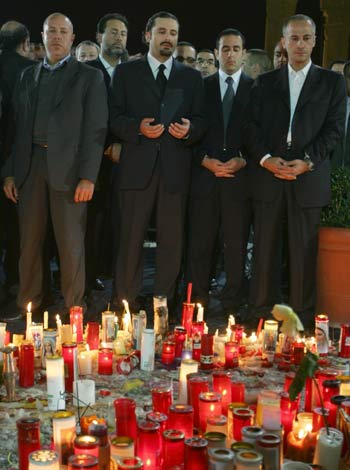
Saad Hariri son of Lebanon’s slain former premier Rafik Hariri praying at his gravesite in central Beirut File picture dated 20 February 2005 (AFP)
BEIRUT, Lebanon, AP – A large billboard on a Beirut street corner bears a picture of Rafik Hariri with a counter ticking off the days since the former prime minister was assassinated and his killers have gone free.
The counter will reach 365 on Tuesday. One year later, the aftershocks of the one-ton truck bomb that killed one of the country’s most prominent politicians still rattle Lebanon and the Middle East.
For Lebanese, the explosion on Feb. 14, 2005 — which also killed 20 others — is known as the “earthquake” that transformed the political landscape beyond imagination.
It set in motion events that drove out the Syrian army and brought in the first anti-Syrian government in decades. The militant Hezbollah, closely tied to Syria and Iran, took seats in the Lebanese government for the first time, ignoring a United Nations demand that it disarm and clashing with the new anti-Syrian majority.
The assassination also shook neighboring Syria, which had all but ruled Lebanon for nearly 30 years. Top Syrian officials have been implicated in Hariri’s murder, and President Bashar Assad is tangled in a confrontation with the United States and the West — under profound pressure to cooperate with the U.N. investigation of the murder.
Syrian-Lebanese relations have seldom been worse. The rift has also pushed Syria and Iran to deepen their already close ties.
While Lebanon eagerly awaits the investigation’s completion, the country is polarized between anti- and pro-Syrian camps — recalling past sectarian and political splits that fueled years of civil war.
So far, the divisions have been contained. But a mysterious campaign of 15 other bombings that have killed 11 people is raising tensions. The victims include three anti-Syrian figures — a politician and two journalists.
Hariri’s son Saad, who became head of the largest parliamentary bloc after his father’s death, returned to Beirut on Sunday after months of self-imposed exile in Saudi Arabia and France. He came back to take part in what were expected to be massive demonstrations Tuesday on the first anniversary of his father’s murder.
“The Lebanese have achieved their freedom and sovereignty,” 35-year-old billionaire businessman said of the past year. “Now, we’re trying to preserve this freedom and this sovereignty.”
Some Lebanese accuse Syria of being behind Hariri’s death and the subsequent bombings, saying it wants to destabilize the country to show there can be no peace without help from Damascus. Syria denies any role in the bombings or Hariri’s murder.
Prime Minister Fuad Saniora, however, is optimistic that the events have strengthened Lebanon.
“The conflict over Lebanon has been decided in favor of the nation, its Arab identity, independence, completion of its liberation and consolidation of its sovereignty,” Saniora, a longtime Hariri confidant, said recently.
Others, however, see the large crater created by the truck bomb that killed Hariri as a symbol that Lebanon remains in limbo while the investigation continues.
“Everything is at a standstill,” said Mohammad Safah, the 27-year-old guardian of Hariri’s grave. “He was the protector of Lebanon and now that he’s gone, the economy is at a standstill, and the security and political situation is worsening.”
In two separate reports to the Security Council last year, chief U.N. investigator Detlev Mehlis of Germany implicated Syria and its allies in the Lebanese security services. Mehlis has now turned the investigation over to Serge Brammertz of Belgium.
Four top Lebanese generals — key figures in Syria’s domination of Lebanon — were arrested and charged with involvement, but the probe has at times appeared stalled.
Syria says investigators are playing politics and serving American interests. It has stalled on full cooperation and Assad has refused to be interviewed about claims he threatened Hariri.
Meanwhile, the Lebanese are divided between those blaming Syria and those claiming Damascus is being framed. The anti-Syrian majority has been unable to consolidate power and has failed to force out pro-Syrian President Emile Lahoud.
Samir Franjieh, an anti-Syrian Christian legislator, acknowledged anti-Syrian forces “have stumbled … and their leaders have been killed or threatened.” But “there is major and noticeable progress: the departure of the Syrian army, the restoration of freedom.”

Lebanese MP Saad Hariri, holds a press conference 12 February 2006 after returning to Beirut ahead of the first anniversary of the killing of his father and 20 other people in a massive Beirut car bombing on February 14 (AFP)

Lebanon’s legislator Saad Hariri, son of slain former Prime Minister Rafik Hariri, seen in poster behind him, speaks during a press conference (AP)
